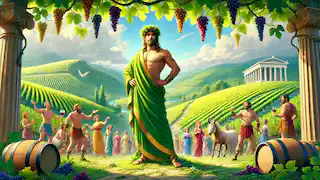The Legend of Dionysus
Reading Time: 6 min

About Story: The Legend of Dionysus is a Myth from greece set in the Ancient. This Dramatic tale explores themes of Nature and is suitable for All Ages. It offers Cultural insights. The god of revelry and chaos finds his place among the Olympians.
In the land of ancient Greece, a realm of gods and mortals, of heroes and monsters, there existed one deity who walked the line between joy and madness, between civilization and wild nature. This was Dionysus, the god of wine, revelry, fertility, and theater. His story is one of mystery and paradox, for he brought both pleasure and chaos, and his presence touched both the highest of the gods and the lowliest of mortals. Born from Zeus, the king of gods, and a mortal woman, Dionysus's tale is one of triumph over tragedy, of finding one's place in the world, and of the eternal tension between order and disorder. This is his legend. In the golden age of the gods, Zeus, ruler of Olympus, descended from his heavenly throne in search of new passions and adventures. It was during one of these journeys that he met Semele, the mortal daughter of Cadmus, king of Thebes, and fell deeply in love with her. Their love was fierce and passionate, but the goddess Hera, Zeus's wife, was known for her jealousy. When Hera discovered that Semele was pregnant with Zeus's child, she devised a plan to destroy her. Disguising herself as an old woman, Hera visited Semele and sowed seeds of doubt in her heart. "If Zeus truly loves you," Hera whispered, "ask him to reveal himself to you in his divine form, as he does for Hera." Semele, unaware of the deception, became obsessed with the idea. When Zeus next visited her, she demanded that he show his true form, as proof of his love. Though Zeus tried to dissuade her, he was bound by a promise never to refuse her requests. Reluctantly, he revealed his divine form, and the sight of it was too much for Semele to bear. Consumed by the divine fire, she perished, leaving behind her unborn child. Zeus, heartbroken, acted swiftly. He rescued the unborn Dionysus from the flames and sewed him into his own thigh to complete the gestation. In time, the child was born anew, fully formed and divine. Thus, Dionysus became the twice-born god, once from his mortal mother and once from his immortal father. As a child of both gods and mortals, Dionysus was a figure of duality, constantly torn between two worlds. Fearing the wrath of Hera, Zeus sent Dionysus to be raised in secrecy. He was hidden in the wilderness, cared for by nymphs and satyrs, the wild and mischievous creatures of the forest. Dionysus grew to love the freedom of nature, embracing the untamed spirit of the woods. He learned the secrets of plants, vines, and especially the grape, from which he would one day craft the first wine. The divine child wandered the hills and forests, accompanied by his followers, a merry band of satyrs, nymphs, and maenads, who danced and sang in his honor. But his peaceful upbringing did not last forever. Hera eventually discovered Dionysus's whereabouts and sent madness to plague him. Driven insane, Dionysus began to wander the world, traveling from land to land, spreading the cultivation of the vine and the secret of wine to the people he met. Wherever he went, he was both loved and feared, for his gifts brought joy and revelry, but also chaos and destruction. After years of wandering, Dionysus grew tired of being an outcast. He sought to reclaim his divine heritage and take his rightful place among the Olympian gods. His journey back to Olympus was not without challenges, for many gods viewed him with suspicion and disdain, considering him too wild and too closely tied to mortals. Dionysus's most famous trial came in Thebes, his mortal mother's homeland. Pentheus, the king of Thebes and Dionysus's cousin, refused to recognize Dionysus as a god and forbade his people from worshiping him. Pentheus saw Dionysus's followers, the maenads, as dangerous and unruly, and he feared the disorder that the god's presence brought to his city. Dionysus, however, was not one to be denied. He appeared in Thebes in disguise, preaching the joys of wine and freedom. His charisma and divine charm soon won over many of the city's women, who joined the maenads in their ecstatic rites on the mountainside. Infuriated, Pentheus tried to imprison Dionysus, but the god's powers were too great. Dionysus easily freed himself, and in a final act of revenge, he drove Pentheus mad. In his madness, Pentheus dressed as a maenad and tried to spy on their wild rituals. Caught in the frenzy of their worship, the maenads, including Pentheus's own mother, tore him apart, believing him to be a wild animal. With his victory in Thebes, Dionysus solidified his status as a god, one who demanded both respect and fear. His followers continued to spread his cult throughout Greece, and soon, even the most skeptical of gods had to acknowledge his power. Dionysus's travels took him across the seas as well as the land. One of the most famous stories of his seafaring adventures involved a group of pirates who dared to abduct the god, mistaking him for a wealthy prince. The pirates, thinking they had captured a valuable ransom, bound Dionysus and set sail across the Aegean. But no ropes could hold the god of revelry, and soon, strange things began to happen on the ship. The mast sprouted grapevines, the sails turned into ivy, and the sound of music filled the air. Dionysus transformed into a lion, roaring with fury, while other wild beasts appeared on the ship. Terrified, the pirates leaped into the sea, where they were transformed into dolphins. Only the helmsman, who had recognized Dionysus as a god and tried to warn the others, was spared. As a reward for his faith, Dionysus granted him safe passage to shore. Dionysus's legacy endured long after his ascension to Olympus. He became one of the most beloved gods of the ancient world, revered not only for his gifts of wine and celebration but also for his role as a god of transformation, capable of blurring the lines between reality and illusion, between the mortal and the divine. His festivals, known as the Dionysia, became a cornerstone of Greek culture, especially in Athens, where they evolved into the first theatrical performances. Tragedy and comedy, the two great genres of Greek drama, were born from the rites of Dionysus, reflecting the god's dual nature as a bringer of both joy and sorrow. To this day, the legend of Dionysus reminds us of the delicate balance between order and chaos, civilization and wildness, and the importance of embracing both sides of our nature. For in Dionysus, the Greeks found a god who celebrated life in all its forms, from the heights of ecstasy to the depths of madness.The Birth of Dionysus

The Wanderer

The Return to Olympus

Dionysus and the Pirates

The Legacy of Dionysus

















